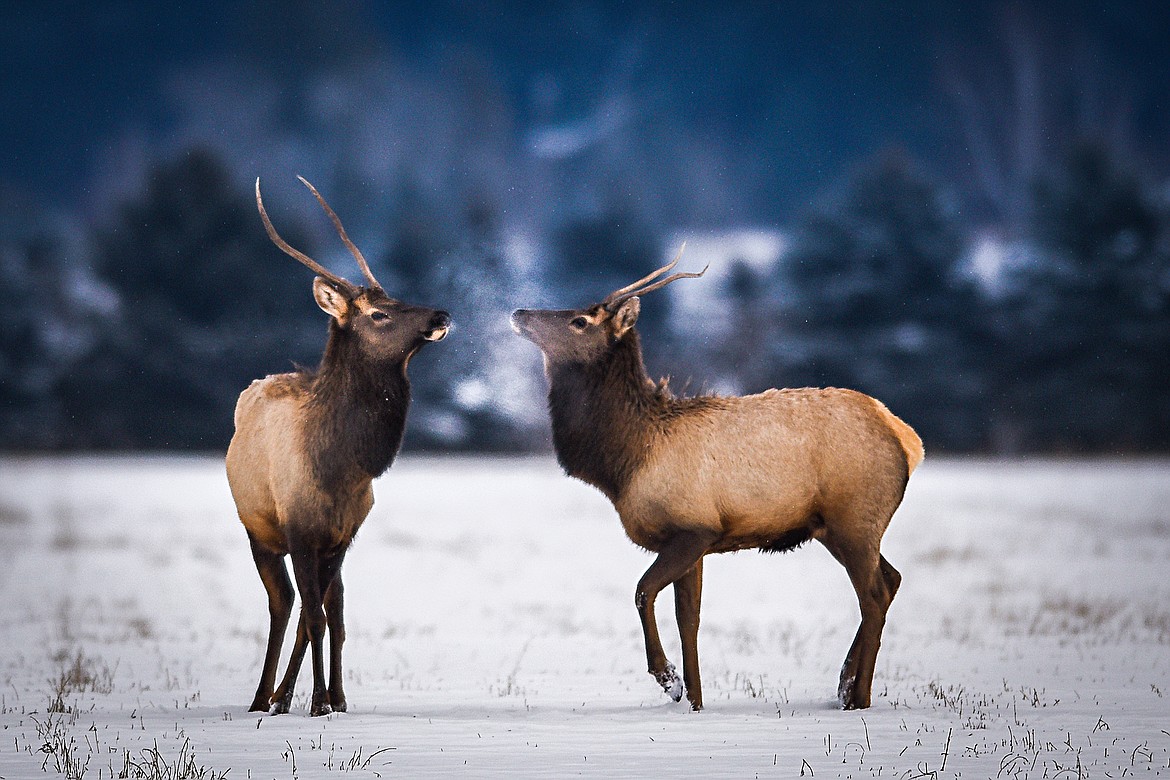Hunters group asks for $200 million of surplus funds to go to land stewardship, restoration fund
KATE HESTON | Hagadone News Network | UPDATED 3 years AGO
Kate Heston covers politics and natural resources for the Daily Inter Lake. She is a graduate of the University of Iowa's journalism program, previously worked as photo editor at the Daily Iowan and was a News21 fellow in Phoenix. She can be reached at [email protected] or 406-758-4459. | December 7, 2022 11:00 PM
A hunting organization is asking that $200 million of the state’s budget surplus go toward the creation of a trust to fund stewardship and restoration projects in rural areas.
The Montana Citizens Elk Management Coalition pitched the idea, known as the Montana Legacy Trust, at a small event in Helena on Dec. 2. Along with helping the land, the fund would benefit Montana’s agricultural and outdoor recreation industries, supporters said.
The effort’s backers envision the trust forging partnerships between ranchers, farmers, government, conservation districts, wildlife managers and other stakeholders through annual grant-based applications that fund restoration projects on both public and private land.
Applicants eligible for funding — under the coalition’s proposal — would generally need to fall under three categories: water restoration, rangeland enhancement and habitat improvement. These categories include fish passage enhancements, water retention work, fencing modifications and managing invasive species, among others.
Sen. Jeff Welborn, R-Dillon, sees merit in the proposal, saying it could be “ongoing in helping the land and the people in rural Montana that own and manage the land to do good things over the long haul.”
Welborn, though, noted that conversations surrounding the budget surplus are only at a “starting point.” The proposed trust could still benefit from Montana’s fiscal windfall, even if the amount granted is less than the requested $200 million.
“I don’t know if [the proposal] is perfect, but it is definitely worth looking at,” Welborn said. “It helps the land and it helps the people. To me, it's a win-win situation.”
Welborn suspects that, if draft legislation was drawn up, the state House of Representatives would take it up first. Still, he said he would welcome supporting the measure in the state Senate.
While the proposal is still very new, other legislators, such as Sen. Pat Flowers, D- Bozeman, are not surprised to see such a proposal coming up, citing the state’s use of funds from recreational marijuana under Gov. Greg Gianforte.
According to Sen. Flowers, “it was pretty clear when Montanans passed a recreational marijuana initiative that the commitment they understood was that there would be a significant amount of money going into habitat” and Montana lands. Gianforte, according to Flowers, has shifted the money from recreational marijuana away to other uses.
Gianforte did not respond to questions about the proposal, but Brooke Metrione, the governor’s press secretary, told the Inter Lake that “the governor is committed to returning [the surplus] to taxpayers and doing what Montana families would do by saving for emergencies, making necessary repairs, and paying off debt.”
Kyle Schmauch, the communications and policy manager for the Senate GOP, said that Republican legislators are committed to finding solutions on elk management, conservation and habitat. He said they planned on reviewing the proposal, especially as more details are released.
Supporters drew inspiration for the proposal from a similar – and successful – effort in Wyoming. Established in 2006, Wyoming’s Wildlife and Natural Resource Trust program has funded more than 750 projects and put $100 million on the ground for restoration projects.
Retired Montana Fish, Wildlife and Parks Deputy Chief Mike Korn said in a statement that Montana’s version would rely on local people to guide it through partner-based programs.
“It’s been shown time and time again that Montana’s best programs are those that break down barriers and are broadly inclusive,” Korn said. “Partnerships will be the lifeblood of this program because of their power to leverage and bring together numerous resources from all corners for the long-term good of the land and all Montanans.”
The Montana Citizens Elk Management Coalition, which launched over a year ago, describes itself as a broad group of Montana hunters and citizens worried about the future of elk management and restoration. The group estimates a one-time investment of $200 million, which could possibly yield $4-$8 million in annual interest to fund the program and staff it.
If the proposal gets the green light, a seven member committee appointed by the governor would be responsible for overseeing the funds and doling out grants, according to Craig Jourdonnais, a research biologist and policy committee member of the Montana Citizens Elk Management Coalition.
“The idea is that this would be a permanent trust for Montanans to reinvest into Montana,” Jourdonnasis told the Inter Lake. “This is a way that we can have something to depend on that will be there in perpetuity.”
Reporter Kate Heston can be reached at [email protected].
ARTICLES BY KATE HESTON

Veteran-owned mobile boat repair service anchors down in the Flathead Valley
The Kramers launched Flathead Mobile Marine to use their skills — they have decades of experience performing routine maintenance checks on a variety of boats as well as working with engines and electrical systems — and help boaters in the community.

With ski season near, resort reaches deal with staff
After 18 months of negotiations, Whitefish Mountain Resort executives and the resort’s ski patrol union are finalizing a one-year contract for the upcoming season.

Trapped in a car wreck, Woods Bay woman credits teens with saving her life
Driving home from a quilting event in Bigfork in September of last year, Carol Martin remembered that the sky was clear, the sun was shining, and she had a headache.

